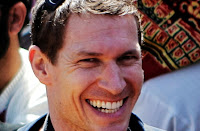This blog talks about ideas that catch my fancy: TED talks, books (including TED Book Club selections), movies (especially Hot Docs documentaries), travel, and other interesting things I read or hear about.
Friday, April 26, 2013
Which Way is the Front Line from Here? The Life and Time of Tim Hetherington
Tim Hetherington was a tall, lanky man with a craggy handsome face, a winning smile and an uncanny capacity for connecting with people. A photojournalist who covered conflict zones, his main goal was to connect with people he was photographing. He felt you had to be more than a photographer, you had to be a participant.
His initial foray was covering the revolution in Liberia, capturing in action the young men whose sole uniform consisted of rust-coloured T-shirts with their cause identified on the front. And he was hooked - not so much on the process of shooting pictures of the weapons and the gore - but on trying to understand the young men involved.
Although his sympathies tended to lie with underdog rebels, he spent a year with an American platoon deployed in the Korengal Valley in Afghanistan. This period solidified his conviction that war created a common bond among men unmatched in the rest of their lives. His friend and colleague Jim Brabazon remarked in the Q&A following the film that as long as there are young men yearning for such a bond, there will always be the raw material for creating wars.
Hetherington and his colleague Sebastian Junger's film Restrepo was nominated for the Academy Award for Best Documentary in 2010. Hetherington traded in his combat gear for a tux and walked through a surreal Hollywood with his fantastically beautiful girlfriend.
Despite making a decision to give up the risky life of the conflict journalist, he was irresistibly drawn to Libya to cover the revolution there. In footage taken in a jeep with other journalist comrades, Tim is heard to ask "Which way is the front line from here?", and this becomes the title of the elegy Junger films in honour of his friend. but sadly lost his life after a piece of shrapnel pierced his femoral artery. Tim's life could have been saved if one of the journalists of rebels with him had been trained how to deal with such trauma, and in his memory, Junger has started a not-for-profit called RISC - Reporters Instructed in Saving Colleagues.
In the Q&A, there was discussion about the increase of young untrained freelancers going to conflict zones, and a reference to the fact that major media companies are not buying photos from freelancers. Brabazon bristled at the idea that this might be because of ethical values of the media. He pointed out that they'd always buy a great photo after the fact, but didn't want to 'commission' it beforehand, in order to avoid any issues of liability, or the cost of insuring the photojournalist.
This was a very good film indeed and I highly recommend it. And Restrepo is now very high on my list of 'must see' films too.
Subscribe to:
Post Comments (Atom)


No comments:
Post a Comment